Leadership Management and Team Working in Professional Practice
VerifiedAdded on 2020/01/15
|9
|3412
|189
Report
AI Summary
This report delves into the critical aspects of leadership management and team working within professional practice, specifically focusing on healthcare settings. It emphasizes the necessity of collective leadership to foster continuous improvement, high-quality patient care, and the empowerment of healthcare staff. The report highlights various leadership attributes, including strength, capability, and the ability to drive transformational change, while also addressing the challenges faced in healthcare environments. It discusses different leadership characteristics adopted by individuals in mental health hospitals, the importance of ethical decision-making, and the role of teamwork in providing effective patient care. Furthermore, it explores the significance of cross-boundary and inter-agency working, person-centered care, and the implementation of transformational change to achieve organizational goals and improve patient outcomes. The report underscores the importance of developing leadership skills, ethical practices, and fostering a collaborative environment to meet the expectations of patients and healthcare professionals. It also emphasizes the significance of adapting to the ever-changing healthcare environment, including business expectations and policy changes. The report concludes by highlighting key success factors for driving transformational change within healthcare organizations.

Leadership Management and
Team Working for Professional
Practice
1
Team Working for Professional
Practice
1
Paraphrase This Document
Need a fresh take? Get an instant paraphrase of this document with our AI Paraphraser
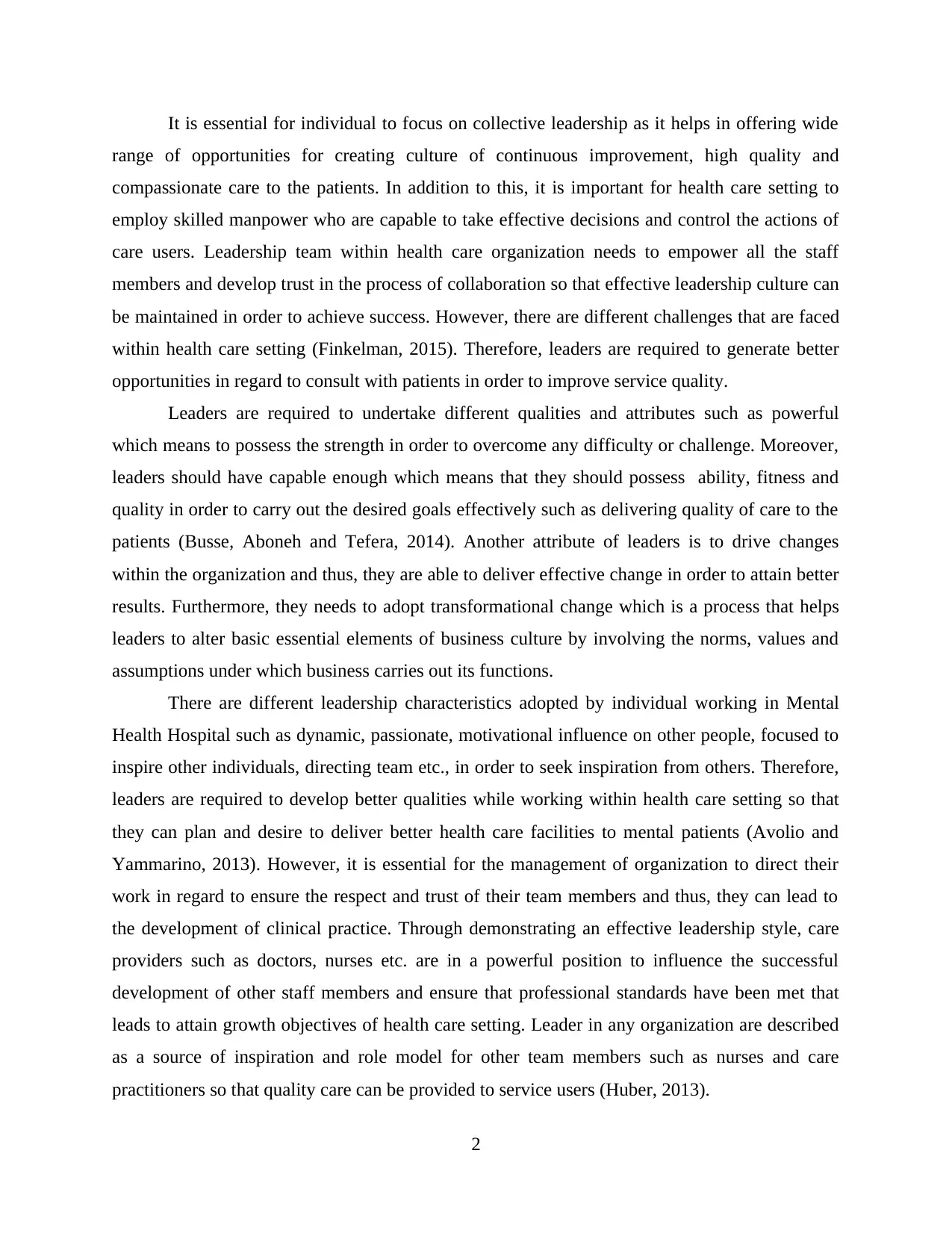
It is essential for individual to focus on collective leadership as it helps in offering wide
range of opportunities for creating culture of continuous improvement, high quality and
compassionate care to the patients. In addition to this, it is important for health care setting to
employ skilled manpower who are capable to take effective decisions and control the actions of
care users. Leadership team within health care organization needs to empower all the staff
members and develop trust in the process of collaboration so that effective leadership culture can
be maintained in order to achieve success. However, there are different challenges that are faced
within health care setting (Finkelman, 2015). Therefore, leaders are required to generate better
opportunities in regard to consult with patients in order to improve service quality.
Leaders are required to undertake different qualities and attributes such as powerful
which means to possess the strength in order to overcome any difficulty or challenge. Moreover,
leaders should have capable enough which means that they should possess ability, fitness and
quality in order to carry out the desired goals effectively such as delivering quality of care to the
patients (Busse, Aboneh and Tefera, 2014). Another attribute of leaders is to drive changes
within the organization and thus, they are able to deliver effective change in order to attain better
results. Furthermore, they needs to adopt transformational change which is a process that helps
leaders to alter basic essential elements of business culture by involving the norms, values and
assumptions under which business carries out its functions.
There are different leadership characteristics adopted by individual working in Mental
Health Hospital such as dynamic, passionate, motivational influence on other people, focused to
inspire other individuals, directing team etc., in order to seek inspiration from others. Therefore,
leaders are required to develop better qualities while working within health care setting so that
they can plan and desire to deliver better health care facilities to mental patients (Avolio and
Yammarino, 2013). However, it is essential for the management of organization to direct their
work in regard to ensure the respect and trust of their team members and thus, they can lead to
the development of clinical practice. Through demonstrating an effective leadership style, care
providers such as doctors, nurses etc. are in a powerful position to influence the successful
development of other staff members and ensure that professional standards have been met that
leads to attain growth objectives of health care setting. Leader in any organization are described
as a source of inspiration and role model for other team members such as nurses and care
practitioners so that quality care can be provided to service users (Huber, 2013).
2
range of opportunities for creating culture of continuous improvement, high quality and
compassionate care to the patients. In addition to this, it is important for health care setting to
employ skilled manpower who are capable to take effective decisions and control the actions of
care users. Leadership team within health care organization needs to empower all the staff
members and develop trust in the process of collaboration so that effective leadership culture can
be maintained in order to achieve success. However, there are different challenges that are faced
within health care setting (Finkelman, 2015). Therefore, leaders are required to generate better
opportunities in regard to consult with patients in order to improve service quality.
Leaders are required to undertake different qualities and attributes such as powerful
which means to possess the strength in order to overcome any difficulty or challenge. Moreover,
leaders should have capable enough which means that they should possess ability, fitness and
quality in order to carry out the desired goals effectively such as delivering quality of care to the
patients (Busse, Aboneh and Tefera, 2014). Another attribute of leaders is to drive changes
within the organization and thus, they are able to deliver effective change in order to attain better
results. Furthermore, they needs to adopt transformational change which is a process that helps
leaders to alter basic essential elements of business culture by involving the norms, values and
assumptions under which business carries out its functions.
There are different leadership characteristics adopted by individual working in Mental
Health Hospital such as dynamic, passionate, motivational influence on other people, focused to
inspire other individuals, directing team etc., in order to seek inspiration from others. Therefore,
leaders are required to develop better qualities while working within health care setting so that
they can plan and desire to deliver better health care facilities to mental patients (Avolio and
Yammarino, 2013). However, it is essential for the management of organization to direct their
work in regard to ensure the respect and trust of their team members and thus, they can lead to
the development of clinical practice. Through demonstrating an effective leadership style, care
providers such as doctors, nurses etc. are in a powerful position to influence the successful
development of other staff members and ensure that professional standards have been met that
leads to attain growth objectives of health care setting. Leader in any organization are described
as a source of inspiration and role model for other team members such as nurses and care
practitioners so that quality care can be provided to service users (Huber, 2013).
2
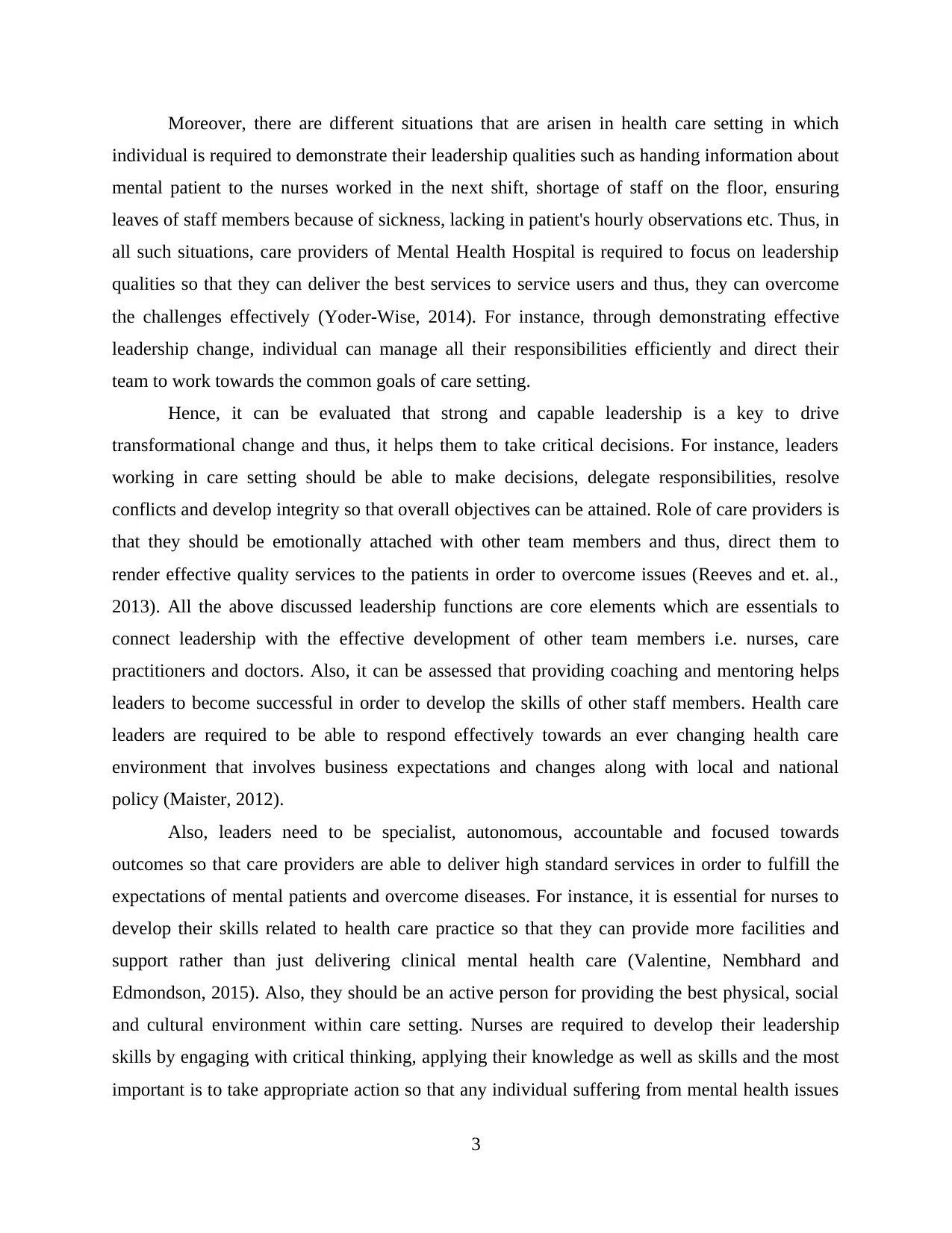
Moreover, there are different situations that are arisen in health care setting in which
individual is required to demonstrate their leadership qualities such as handing information about
mental patient to the nurses worked in the next shift, shortage of staff on the floor, ensuring
leaves of staff members because of sickness, lacking in patient's hourly observations etc. Thus, in
all such situations, care providers of Mental Health Hospital is required to focus on leadership
qualities so that they can deliver the best services to service users and thus, they can overcome
the challenges effectively (Yoder-Wise, 2014). For instance, through demonstrating effective
leadership change, individual can manage all their responsibilities efficiently and direct their
team to work towards the common goals of care setting.
Hence, it can be evaluated that strong and capable leadership is a key to drive
transformational change and thus, it helps them to take critical decisions. For instance, leaders
working in care setting should be able to make decisions, delegate responsibilities, resolve
conflicts and develop integrity so that overall objectives can be attained. Role of care providers is
that they should be emotionally attached with other team members and thus, direct them to
render effective quality services to the patients in order to overcome issues (Reeves and et. al.,
2013). All the above discussed leadership functions are core elements which are essentials to
connect leadership with the effective development of other team members i.e. nurses, care
practitioners and doctors. Also, it can be assessed that providing coaching and mentoring helps
leaders to become successful in order to develop the skills of other staff members. Health care
leaders are required to be able to respond effectively towards an ever changing health care
environment that involves business expectations and changes along with local and national
policy (Maister, 2012).
Also, leaders need to be specialist, autonomous, accountable and focused towards
outcomes so that care providers are able to deliver high standard services in order to fulfill the
expectations of mental patients and overcome diseases. For instance, it is essential for nurses to
develop their skills related to health care practice so that they can provide more facilities and
support rather than just delivering clinical mental health care (Valentine, Nembhard and
Edmondson, 2015). Also, they should be an active person for providing the best physical, social
and cultural environment within care setting. Nurses are required to develop their leadership
skills by engaging with critical thinking, applying their knowledge as well as skills and the most
important is to take appropriate action so that any individual suffering from mental health issues
3
individual is required to demonstrate their leadership qualities such as handing information about
mental patient to the nurses worked in the next shift, shortage of staff on the floor, ensuring
leaves of staff members because of sickness, lacking in patient's hourly observations etc. Thus, in
all such situations, care providers of Mental Health Hospital is required to focus on leadership
qualities so that they can deliver the best services to service users and thus, they can overcome
the challenges effectively (Yoder-Wise, 2014). For instance, through demonstrating effective
leadership change, individual can manage all their responsibilities efficiently and direct their
team to work towards the common goals of care setting.
Hence, it can be evaluated that strong and capable leadership is a key to drive
transformational change and thus, it helps them to take critical decisions. For instance, leaders
working in care setting should be able to make decisions, delegate responsibilities, resolve
conflicts and develop integrity so that overall objectives can be attained. Role of care providers is
that they should be emotionally attached with other team members and thus, direct them to
render effective quality services to the patients in order to overcome issues (Reeves and et. al.,
2013). All the above discussed leadership functions are core elements which are essentials to
connect leadership with the effective development of other team members i.e. nurses, care
practitioners and doctors. Also, it can be assessed that providing coaching and mentoring helps
leaders to become successful in order to develop the skills of other staff members. Health care
leaders are required to be able to respond effectively towards an ever changing health care
environment that involves business expectations and changes along with local and national
policy (Maister, 2012).
Also, leaders need to be specialist, autonomous, accountable and focused towards
outcomes so that care providers are able to deliver high standard services in order to fulfill the
expectations of mental patients and overcome diseases. For instance, it is essential for nurses to
develop their skills related to health care practice so that they can provide more facilities and
support rather than just delivering clinical mental health care (Valentine, Nembhard and
Edmondson, 2015). Also, they should be an active person for providing the best physical, social
and cultural environment within care setting. Nurses are required to develop their leadership
skills by engaging with critical thinking, applying their knowledge as well as skills and the most
important is to take appropriate action so that any individual suffering from mental health issues
3
⊘ This is a preview!⊘
Do you want full access?
Subscribe today to unlock all pages.

Trusted by 1+ million students worldwide
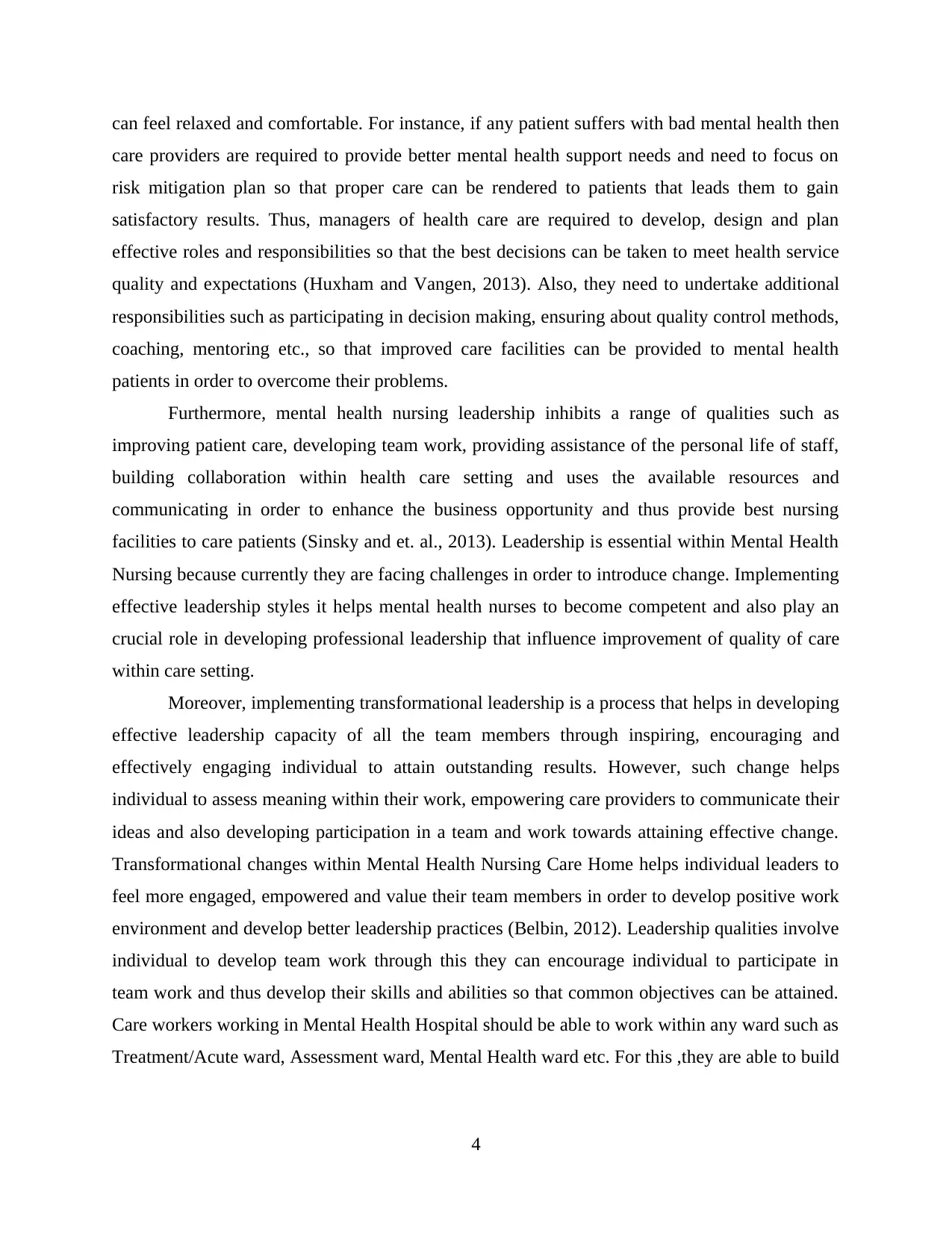
can feel relaxed and comfortable. For instance, if any patient suffers with bad mental health then
care providers are required to provide better mental health support needs and need to focus on
risk mitigation plan so that proper care can be rendered to patients that leads them to gain
satisfactory results. Thus, managers of health care are required to develop, design and plan
effective roles and responsibilities so that the best decisions can be taken to meet health service
quality and expectations (Huxham and Vangen, 2013). Also, they need to undertake additional
responsibilities such as participating in decision making, ensuring about quality control methods,
coaching, mentoring etc., so that improved care facilities can be provided to mental health
patients in order to overcome their problems.
Furthermore, mental health nursing leadership inhibits a range of qualities such as
improving patient care, developing team work, providing assistance of the personal life of staff,
building collaboration within health care setting and uses the available resources and
communicating in order to enhance the business opportunity and thus provide best nursing
facilities to care patients (Sinsky and et. al., 2013). Leadership is essential within Mental Health
Nursing because currently they are facing challenges in order to introduce change. Implementing
effective leadership styles it helps mental health nurses to become competent and also play an
crucial role in developing professional leadership that influence improvement of quality of care
within care setting.
Moreover, implementing transformational leadership is a process that helps in developing
effective leadership capacity of all the team members through inspiring, encouraging and
effectively engaging individual to attain outstanding results. However, such change helps
individual to assess meaning within their work, empowering care providers to communicate their
ideas and also developing participation in a team and work towards attaining effective change.
Transformational changes within Mental Health Nursing Care Home helps individual leaders to
feel more engaged, empowered and value their team members in order to develop positive work
environment and develop better leadership practices (Belbin, 2012). Leadership qualities involve
individual to develop team work through this they can encourage individual to participate in
team work and thus develop their skills and abilities so that common objectives can be attained.
Care workers working in Mental Health Hospital should be able to work within any ward such as
Treatment/Acute ward, Assessment ward, Mental Health ward etc. For this ,they are able to build
4
care providers are required to provide better mental health support needs and need to focus on
risk mitigation plan so that proper care can be rendered to patients that leads them to gain
satisfactory results. Thus, managers of health care are required to develop, design and plan
effective roles and responsibilities so that the best decisions can be taken to meet health service
quality and expectations (Huxham and Vangen, 2013). Also, they need to undertake additional
responsibilities such as participating in decision making, ensuring about quality control methods,
coaching, mentoring etc., so that improved care facilities can be provided to mental health
patients in order to overcome their problems.
Furthermore, mental health nursing leadership inhibits a range of qualities such as
improving patient care, developing team work, providing assistance of the personal life of staff,
building collaboration within health care setting and uses the available resources and
communicating in order to enhance the business opportunity and thus provide best nursing
facilities to care patients (Sinsky and et. al., 2013). Leadership is essential within Mental Health
Nursing because currently they are facing challenges in order to introduce change. Implementing
effective leadership styles it helps mental health nurses to become competent and also play an
crucial role in developing professional leadership that influence improvement of quality of care
within care setting.
Moreover, implementing transformational leadership is a process that helps in developing
effective leadership capacity of all the team members through inspiring, encouraging and
effectively engaging individual to attain outstanding results. However, such change helps
individual to assess meaning within their work, empowering care providers to communicate their
ideas and also developing participation in a team and work towards attaining effective change.
Transformational changes within Mental Health Nursing Care Home helps individual leaders to
feel more engaged, empowered and value their team members in order to develop positive work
environment and develop better leadership practices (Belbin, 2012). Leadership qualities involve
individual to develop team work through this they can encourage individual to participate in
team work and thus develop their skills and abilities so that common objectives can be attained.
Care workers working in Mental Health Hospital should be able to work within any ward such as
Treatment/Acute ward, Assessment ward, Mental Health ward etc. For this ,they are able to build
4
Paraphrase This Document
Need a fresh take? Get an instant paraphrase of this document with our AI Paraphraser
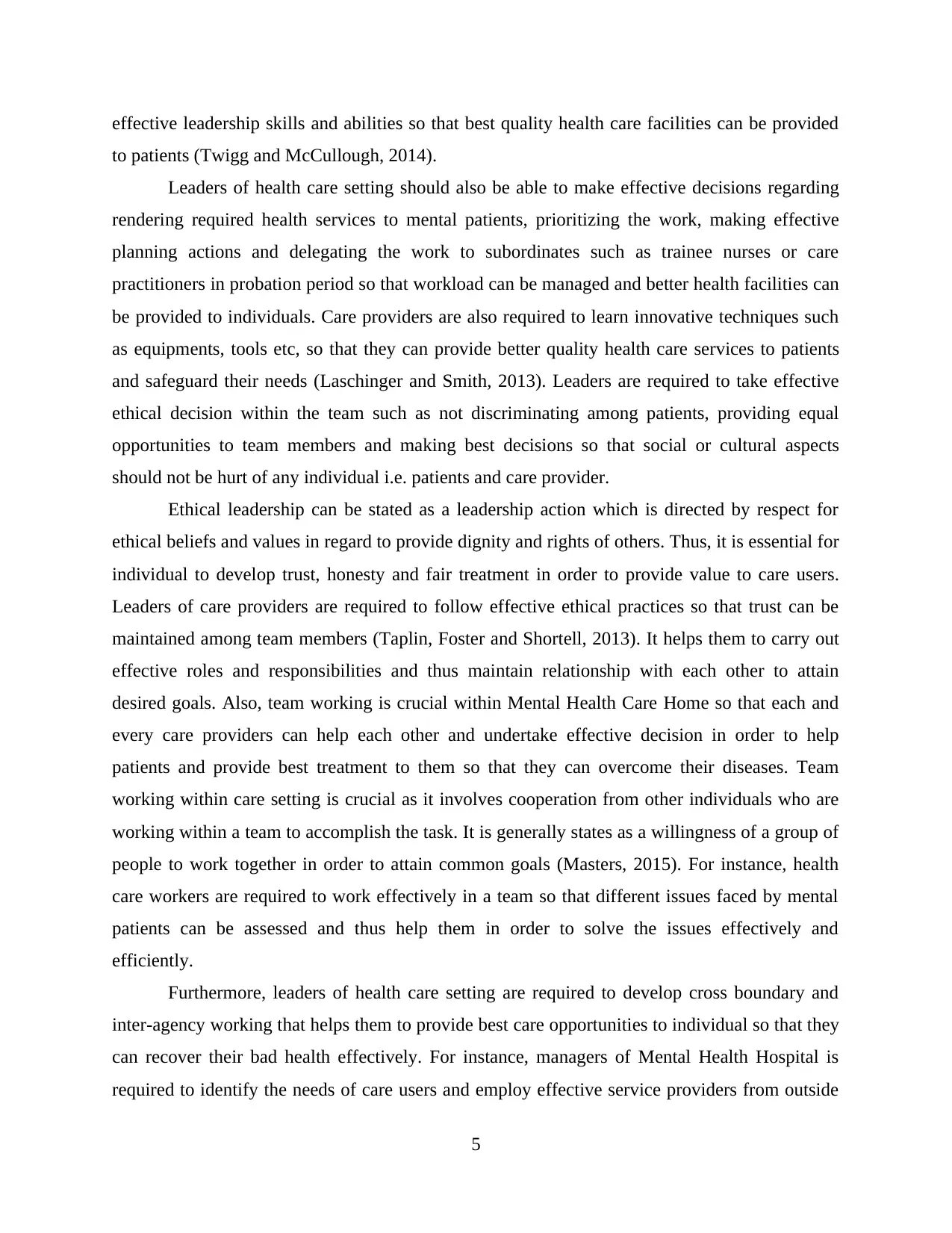
effective leadership skills and abilities so that best quality health care facilities can be provided
to patients (Twigg and McCullough, 2014).
Leaders of health care setting should also be able to make effective decisions regarding
rendering required health services to mental patients, prioritizing the work, making effective
planning actions and delegating the work to subordinates such as trainee nurses or care
practitioners in probation period so that workload can be managed and better health facilities can
be provided to individuals. Care providers are also required to learn innovative techniques such
as equipments, tools etc, so that they can provide better quality health care services to patients
and safeguard their needs (Laschinger and Smith, 2013). Leaders are required to take effective
ethical decision within the team such as not discriminating among patients, providing equal
opportunities to team members and making best decisions so that social or cultural aspects
should not be hurt of any individual i.e. patients and care provider.
Ethical leadership can be stated as a leadership action which is directed by respect for
ethical beliefs and values in regard to provide dignity and rights of others. Thus, it is essential for
individual to develop trust, honesty and fair treatment in order to provide value to care users.
Leaders of care providers are required to follow effective ethical practices so that trust can be
maintained among team members (Taplin, Foster and Shortell, 2013). It helps them to carry out
effective roles and responsibilities and thus maintain relationship with each other to attain
desired goals. Also, team working is crucial within Mental Health Care Home so that each and
every care providers can help each other and undertake effective decision in order to help
patients and provide best treatment to them so that they can overcome their diseases. Team
working within care setting is crucial as it involves cooperation from other individuals who are
working within a team to accomplish the task. It is generally states as a willingness of a group of
people to work together in order to attain common goals (Masters, 2015). For instance, health
care workers are required to work effectively in a team so that different issues faced by mental
patients can be assessed and thus help them in order to solve the issues effectively and
efficiently.
Furthermore, leaders of health care setting are required to develop cross boundary and
inter-agency working that helps them to provide best care opportunities to individual so that they
can recover their bad health effectively. For instance, managers of Mental Health Hospital is
required to identify the needs of care users and employ effective service providers from outside
5
to patients (Twigg and McCullough, 2014).
Leaders of health care setting should also be able to make effective decisions regarding
rendering required health services to mental patients, prioritizing the work, making effective
planning actions and delegating the work to subordinates such as trainee nurses or care
practitioners in probation period so that workload can be managed and better health facilities can
be provided to individuals. Care providers are also required to learn innovative techniques such
as equipments, tools etc, so that they can provide better quality health care services to patients
and safeguard their needs (Laschinger and Smith, 2013). Leaders are required to take effective
ethical decision within the team such as not discriminating among patients, providing equal
opportunities to team members and making best decisions so that social or cultural aspects
should not be hurt of any individual i.e. patients and care provider.
Ethical leadership can be stated as a leadership action which is directed by respect for
ethical beliefs and values in regard to provide dignity and rights of others. Thus, it is essential for
individual to develop trust, honesty and fair treatment in order to provide value to care users.
Leaders of care providers are required to follow effective ethical practices so that trust can be
maintained among team members (Taplin, Foster and Shortell, 2013). It helps them to carry out
effective roles and responsibilities and thus maintain relationship with each other to attain
desired goals. Also, team working is crucial within Mental Health Care Home so that each and
every care providers can help each other and undertake effective decision in order to help
patients and provide best treatment to them so that they can overcome their diseases. Team
working within care setting is crucial as it involves cooperation from other individuals who are
working within a team to accomplish the task. It is generally states as a willingness of a group of
people to work together in order to attain common goals (Masters, 2015). For instance, health
care workers are required to work effectively in a team so that different issues faced by mental
patients can be assessed and thus help them in order to solve the issues effectively and
efficiently.
Furthermore, leaders of health care setting are required to develop cross boundary and
inter-agency working that helps them to provide best care opportunities to individual so that they
can recover their bad health effectively. For instance, managers of Mental Health Hospital is
required to identify the needs of care users and employ effective service providers from outside
5
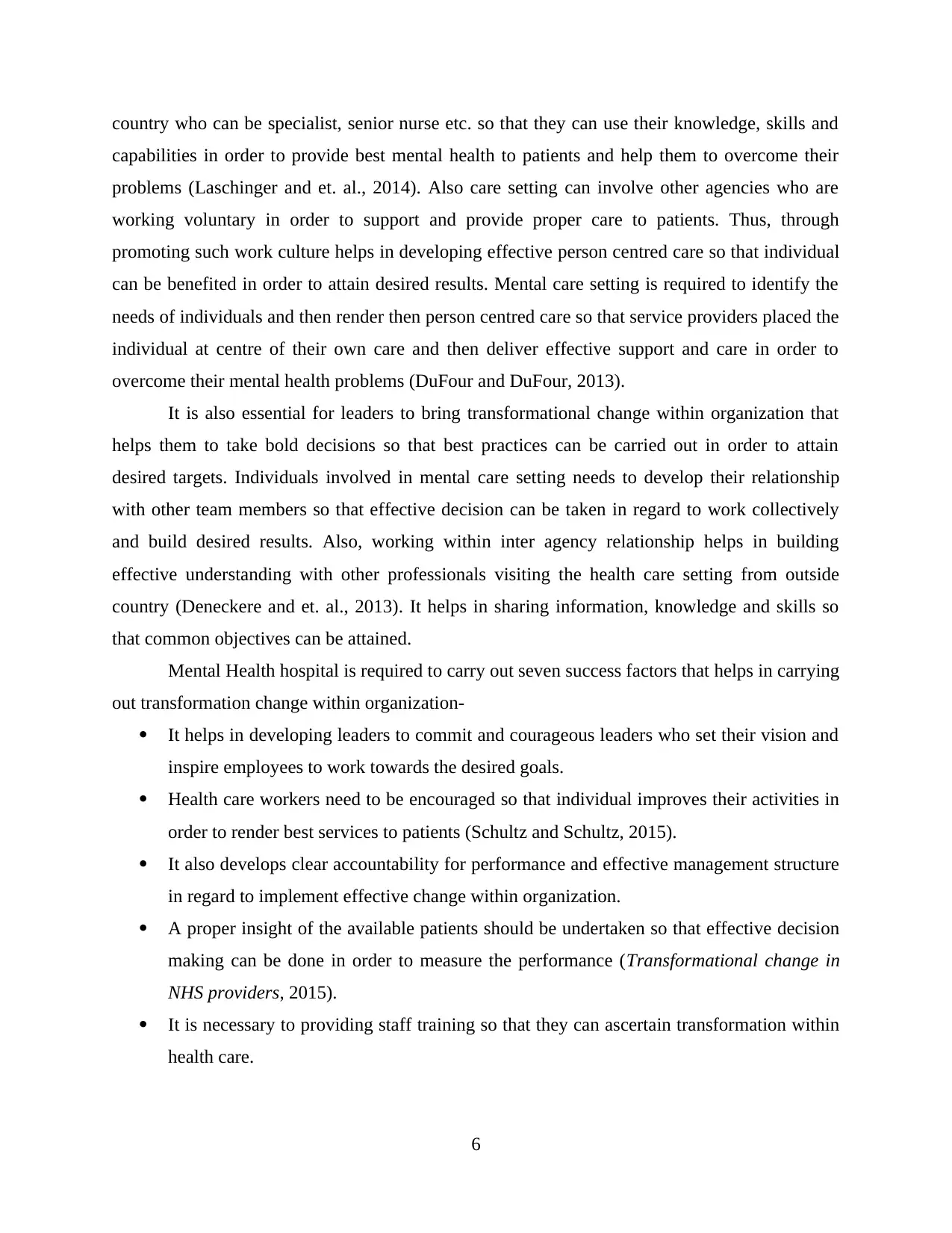
country who can be specialist, senior nurse etc. so that they can use their knowledge, skills and
capabilities in order to provide best mental health to patients and help them to overcome their
problems (Laschinger and et. al., 2014). Also care setting can involve other agencies who are
working voluntary in order to support and provide proper care to patients. Thus, through
promoting such work culture helps in developing effective person centred care so that individual
can be benefited in order to attain desired results. Mental care setting is required to identify the
needs of individuals and then render then person centred care so that service providers placed the
individual at centre of their own care and then deliver effective support and care in order to
overcome their mental health problems (DuFour and DuFour, 2013).
It is also essential for leaders to bring transformational change within organization that
helps them to take bold decisions so that best practices can be carried out in order to attain
desired targets. Individuals involved in mental care setting needs to develop their relationship
with other team members so that effective decision can be taken in regard to work collectively
and build desired results. Also, working within inter agency relationship helps in building
effective understanding with other professionals visiting the health care setting from outside
country (Deneckere and et. al., 2013). It helps in sharing information, knowledge and skills so
that common objectives can be attained.
Mental Health hospital is required to carry out seven success factors that helps in carrying
out transformation change within organization-
It helps in developing leaders to commit and courageous leaders who set their vision and
inspire employees to work towards the desired goals.
Health care workers need to be encouraged so that individual improves their activities in
order to render best services to patients (Schultz and Schultz, 2015).
It also develops clear accountability for performance and effective management structure
in regard to implement effective change within organization.
A proper insight of the available patients should be undertaken so that effective decision
making can be done in order to measure the performance (Transformational change in
NHS providers, 2015).
It is necessary to providing staff training so that they can ascertain transformation within
health care.
6
capabilities in order to provide best mental health to patients and help them to overcome their
problems (Laschinger and et. al., 2014). Also care setting can involve other agencies who are
working voluntary in order to support and provide proper care to patients. Thus, through
promoting such work culture helps in developing effective person centred care so that individual
can be benefited in order to attain desired results. Mental care setting is required to identify the
needs of individuals and then render then person centred care so that service providers placed the
individual at centre of their own care and then deliver effective support and care in order to
overcome their mental health problems (DuFour and DuFour, 2013).
It is also essential for leaders to bring transformational change within organization that
helps them to take bold decisions so that best practices can be carried out in order to attain
desired targets. Individuals involved in mental care setting needs to develop their relationship
with other team members so that effective decision can be taken in regard to work collectively
and build desired results. Also, working within inter agency relationship helps in building
effective understanding with other professionals visiting the health care setting from outside
country (Deneckere and et. al., 2013). It helps in sharing information, knowledge and skills so
that common objectives can be attained.
Mental Health hospital is required to carry out seven success factors that helps in carrying
out transformation change within organization-
It helps in developing leaders to commit and courageous leaders who set their vision and
inspire employees to work towards the desired goals.
Health care workers need to be encouraged so that individual improves their activities in
order to render best services to patients (Schultz and Schultz, 2015).
It also develops clear accountability for performance and effective management structure
in regard to implement effective change within organization.
A proper insight of the available patients should be undertaken so that effective decision
making can be done in order to measure the performance (Transformational change in
NHS providers, 2015).
It is necessary to providing staff training so that they can ascertain transformation within
health care.
6
⊘ This is a preview!⊘
Do you want full access?
Subscribe today to unlock all pages.

Trusted by 1+ million students worldwide
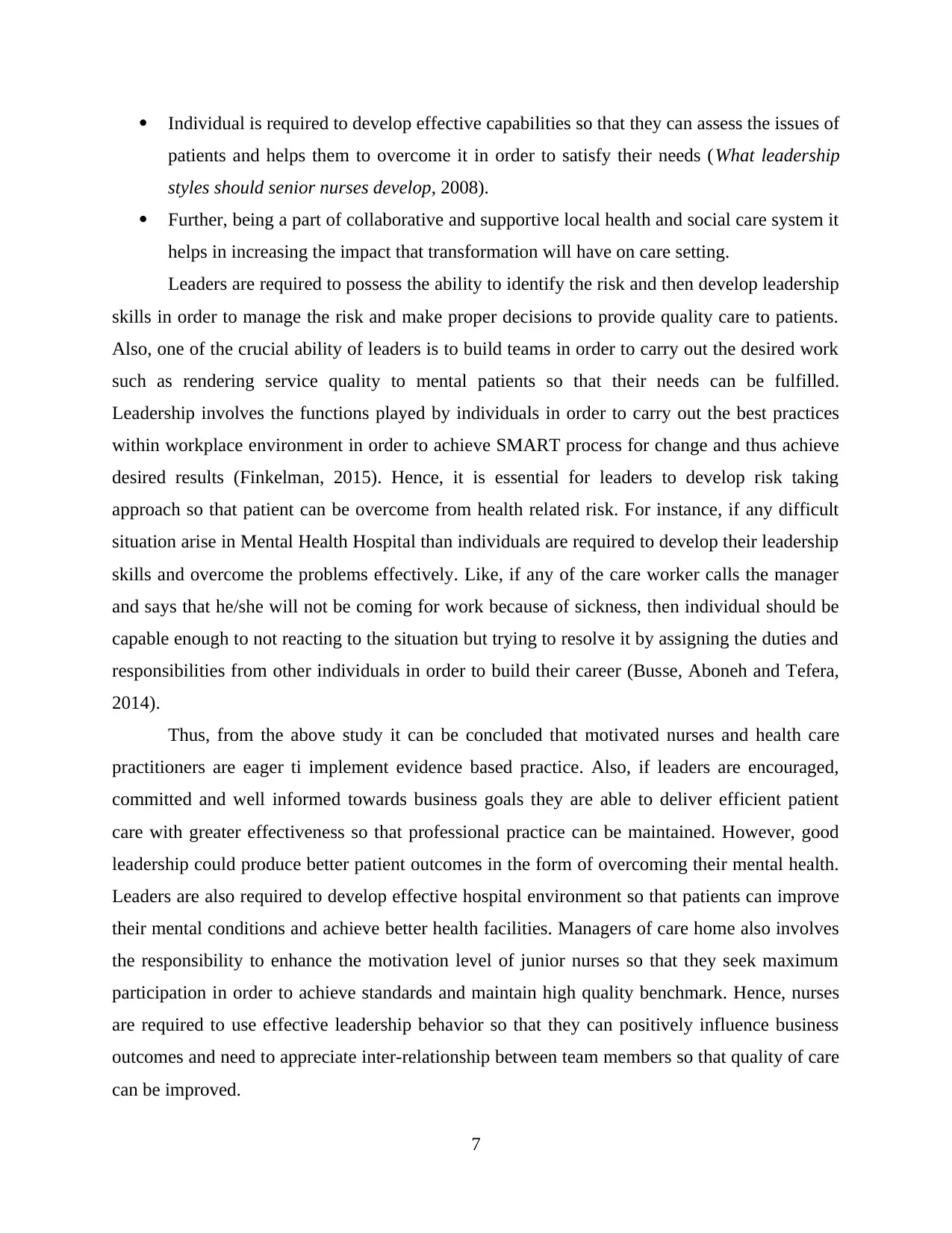
Individual is required to develop effective capabilities so that they can assess the issues of
patients and helps them to overcome it in order to satisfy their needs (What leadership
styles should senior nurses develop, 2008).
Further, being a part of collaborative and supportive local health and social care system it
helps in increasing the impact that transformation will have on care setting.
Leaders are required to possess the ability to identify the risk and then develop leadership
skills in order to manage the risk and make proper decisions to provide quality care to patients.
Also, one of the crucial ability of leaders is to build teams in order to carry out the desired work
such as rendering service quality to mental patients so that their needs can be fulfilled.
Leadership involves the functions played by individuals in order to carry out the best practices
within workplace environment in order to achieve SMART process for change and thus achieve
desired results (Finkelman, 2015). Hence, it is essential for leaders to develop risk taking
approach so that patient can be overcome from health related risk. For instance, if any difficult
situation arise in Mental Health Hospital than individuals are required to develop their leadership
skills and overcome the problems effectively. Like, if any of the care worker calls the manager
and says that he/she will not be coming for work because of sickness, then individual should be
capable enough to not reacting to the situation but trying to resolve it by assigning the duties and
responsibilities from other individuals in order to build their career (Busse, Aboneh and Tefera,
2014).
Thus, from the above study it can be concluded that motivated nurses and health care
practitioners are eager ti implement evidence based practice. Also, if leaders are encouraged,
committed and well informed towards business goals they are able to deliver efficient patient
care with greater effectiveness so that professional practice can be maintained. However, good
leadership could produce better patient outcomes in the form of overcoming their mental health.
Leaders are also required to develop effective hospital environment so that patients can improve
their mental conditions and achieve better health facilities. Managers of care home also involves
the responsibility to enhance the motivation level of junior nurses so that they seek maximum
participation in order to achieve standards and maintain high quality benchmark. Hence, nurses
are required to use effective leadership behavior so that they can positively influence business
outcomes and need to appreciate inter-relationship between team members so that quality of care
can be improved.
7
patients and helps them to overcome it in order to satisfy their needs (What leadership
styles should senior nurses develop, 2008).
Further, being a part of collaborative and supportive local health and social care system it
helps in increasing the impact that transformation will have on care setting.
Leaders are required to possess the ability to identify the risk and then develop leadership
skills in order to manage the risk and make proper decisions to provide quality care to patients.
Also, one of the crucial ability of leaders is to build teams in order to carry out the desired work
such as rendering service quality to mental patients so that their needs can be fulfilled.
Leadership involves the functions played by individuals in order to carry out the best practices
within workplace environment in order to achieve SMART process for change and thus achieve
desired results (Finkelman, 2015). Hence, it is essential for leaders to develop risk taking
approach so that patient can be overcome from health related risk. For instance, if any difficult
situation arise in Mental Health Hospital than individuals are required to develop their leadership
skills and overcome the problems effectively. Like, if any of the care worker calls the manager
and says that he/she will not be coming for work because of sickness, then individual should be
capable enough to not reacting to the situation but trying to resolve it by assigning the duties and
responsibilities from other individuals in order to build their career (Busse, Aboneh and Tefera,
2014).
Thus, from the above study it can be concluded that motivated nurses and health care
practitioners are eager ti implement evidence based practice. Also, if leaders are encouraged,
committed and well informed towards business goals they are able to deliver efficient patient
care with greater effectiveness so that professional practice can be maintained. However, good
leadership could produce better patient outcomes in the form of overcoming their mental health.
Leaders are also required to develop effective hospital environment so that patients can improve
their mental conditions and achieve better health facilities. Managers of care home also involves
the responsibility to enhance the motivation level of junior nurses so that they seek maximum
participation in order to achieve standards and maintain high quality benchmark. Hence, nurses
are required to use effective leadership behavior so that they can positively influence business
outcomes and need to appreciate inter-relationship between team members so that quality of care
can be improved.
7
Paraphrase This Document
Need a fresh take? Get an instant paraphrase of this document with our AI Paraphraser
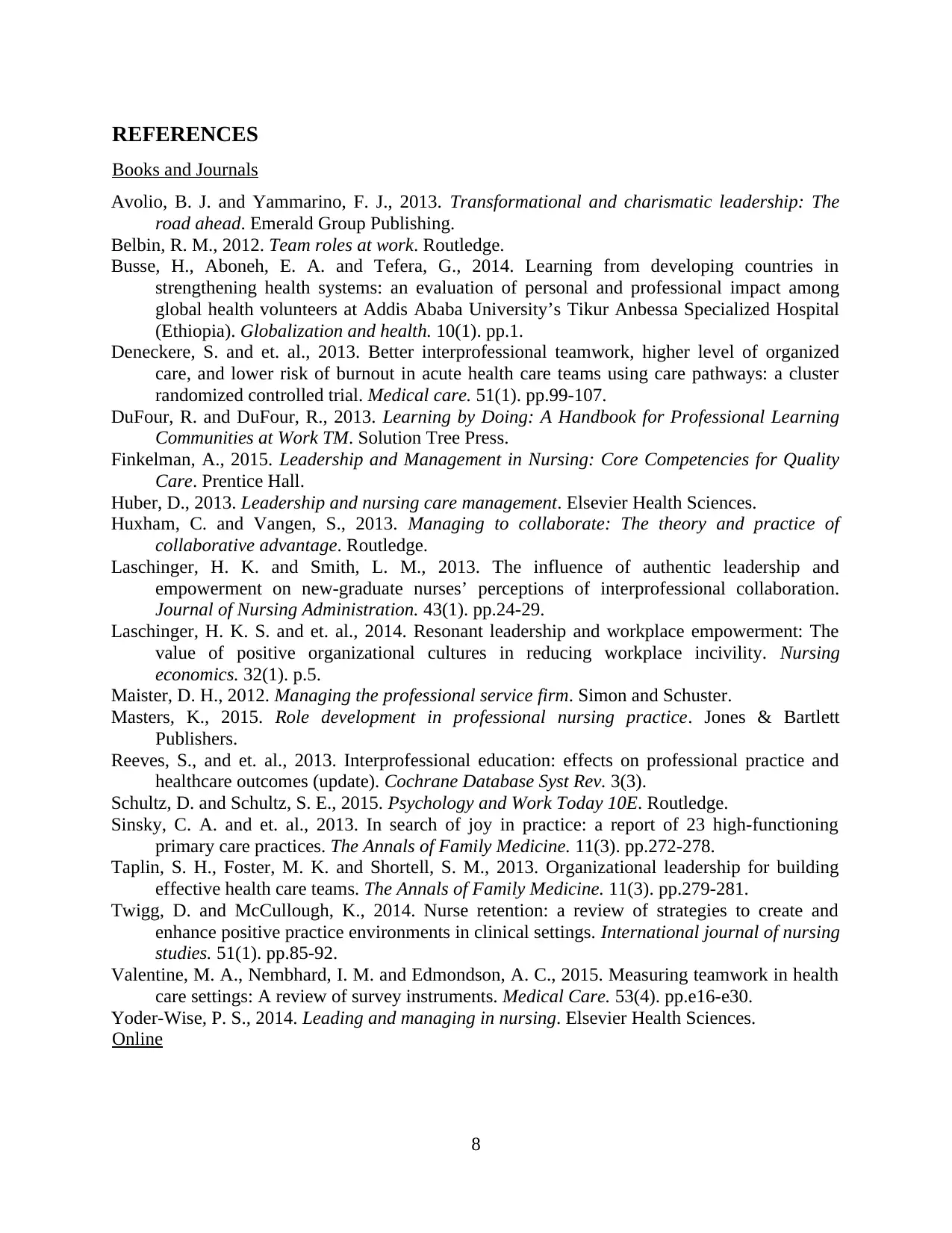
REFERENCES
Books and Journals
Avolio, B. J. and Yammarino, F. J., 2013. Transformational and charismatic leadership: The
road ahead. Emerald Group Publishing.
Belbin, R. M., 2012. Team roles at work. Routledge.
Busse, H., Aboneh, E. A. and Tefera, G., 2014. Learning from developing countries in
strengthening health systems: an evaluation of personal and professional impact among
global health volunteers at Addis Ababa University’s Tikur Anbessa Specialized Hospital
(Ethiopia). Globalization and health. 10(1). pp.1.
Deneckere, S. and et. al., 2013. Better interprofessional teamwork, higher level of organized
care, and lower risk of burnout in acute health care teams using care pathways: a cluster
randomized controlled trial. Medical care. 51(1). pp.99-107.
DuFour, R. and DuFour, R., 2013. Learning by Doing: A Handbook for Professional Learning
Communities at Work TM. Solution Tree Press.
Finkelman, A., 2015. Leadership and Management in Nursing: Core Competencies for Quality
Care. Prentice Hall.
Huber, D., 2013. Leadership and nursing care management. Elsevier Health Sciences.
Huxham, C. and Vangen, S., 2013. Managing to collaborate: The theory and practice of
collaborative advantage. Routledge.
Laschinger, H. K. and Smith, L. M., 2013. The influence of authentic leadership and
empowerment on new-graduate nurses’ perceptions of interprofessional collaboration.
Journal of Nursing Administration. 43(1). pp.24-29.
Laschinger, H. K. S. and et. al., 2014. Resonant leadership and workplace empowerment: The
value of positive organizational cultures in reducing workplace incivility. Nursing
economics. 32(1). p.5.
Maister, D. H., 2012. Managing the professional service firm. Simon and Schuster.
Masters, K., 2015. Role development in professional nursing practice. Jones & Bartlett
Publishers.
Reeves, S., and et. al., 2013. Interprofessional education: effects on professional practice and
healthcare outcomes (update). Cochrane Database Syst Rev. 3(3).
Schultz, D. and Schultz, S. E., 2015. Psychology and Work Today 10E. Routledge.
Sinsky, C. A. and et. al., 2013. In search of joy in practice: a report of 23 high-functioning
primary care practices. The Annals of Family Medicine. 11(3). pp.272-278.
Taplin, S. H., Foster, M. K. and Shortell, S. M., 2013. Organizational leadership for building
effective health care teams. The Annals of Family Medicine. 11(3). pp.279-281.
Twigg, D. and McCullough, K., 2014. Nurse retention: a review of strategies to create and
enhance positive practice environments in clinical settings. International journal of nursing
studies. 51(1). pp.85-92.
Valentine, M. A., Nembhard, I. M. and Edmondson, A. C., 2015. Measuring teamwork in health
care settings: A review of survey instruments. Medical Care. 53(4). pp.e16-e30.
Yoder-Wise, P. S., 2014. Leading and managing in nursing. Elsevier Health Sciences.
Online
8
Books and Journals
Avolio, B. J. and Yammarino, F. J., 2013. Transformational and charismatic leadership: The
road ahead. Emerald Group Publishing.
Belbin, R. M., 2012. Team roles at work. Routledge.
Busse, H., Aboneh, E. A. and Tefera, G., 2014. Learning from developing countries in
strengthening health systems: an evaluation of personal and professional impact among
global health volunteers at Addis Ababa University’s Tikur Anbessa Specialized Hospital
(Ethiopia). Globalization and health. 10(1). pp.1.
Deneckere, S. and et. al., 2013. Better interprofessional teamwork, higher level of organized
care, and lower risk of burnout in acute health care teams using care pathways: a cluster
randomized controlled trial. Medical care. 51(1). pp.99-107.
DuFour, R. and DuFour, R., 2013. Learning by Doing: A Handbook for Professional Learning
Communities at Work TM. Solution Tree Press.
Finkelman, A., 2015. Leadership and Management in Nursing: Core Competencies for Quality
Care. Prentice Hall.
Huber, D., 2013. Leadership and nursing care management. Elsevier Health Sciences.
Huxham, C. and Vangen, S., 2013. Managing to collaborate: The theory and practice of
collaborative advantage. Routledge.
Laschinger, H. K. and Smith, L. M., 2013. The influence of authentic leadership and
empowerment on new-graduate nurses’ perceptions of interprofessional collaboration.
Journal of Nursing Administration. 43(1). pp.24-29.
Laschinger, H. K. S. and et. al., 2014. Resonant leadership and workplace empowerment: The
value of positive organizational cultures in reducing workplace incivility. Nursing
economics. 32(1). p.5.
Maister, D. H., 2012. Managing the professional service firm. Simon and Schuster.
Masters, K., 2015. Role development in professional nursing practice. Jones & Bartlett
Publishers.
Reeves, S., and et. al., 2013. Interprofessional education: effects on professional practice and
healthcare outcomes (update). Cochrane Database Syst Rev. 3(3).
Schultz, D. and Schultz, S. E., 2015. Psychology and Work Today 10E. Routledge.
Sinsky, C. A. and et. al., 2013. In search of joy in practice: a report of 23 high-functioning
primary care practices. The Annals of Family Medicine. 11(3). pp.272-278.
Taplin, S. H., Foster, M. K. and Shortell, S. M., 2013. Organizational leadership for building
effective health care teams. The Annals of Family Medicine. 11(3). pp.279-281.
Twigg, D. and McCullough, K., 2014. Nurse retention: a review of strategies to create and
enhance positive practice environments in clinical settings. International journal of nursing
studies. 51(1). pp.85-92.
Valentine, M. A., Nembhard, I. M. and Edmondson, A. C., 2015. Measuring teamwork in health
care settings: A review of survey instruments. Medical Care. 53(4). pp.e16-e30.
Yoder-Wise, P. S., 2014. Leading and managing in nursing. Elsevier Health Sciences.
Online
8

Transformational change in NHS providers, 2015. [Online}. Available through:
<http://www.health.org.uk/sites/default/files/TransofrmationalChangeInNHSProviders_C
Csupplement.pdf>. [Accessed on 23rd March 2016].
What leadership styles should senior nurses develop, 2008. [Online}. Available through:
<http://www.nursingtimes.net/clinical-subjects/leadership/what-leadership-styles-should-
senior-nurses-develop/1811643.fullarticle>. [Accessed on 23rd March 2016].
9
<http://www.health.org.uk/sites/default/files/TransofrmationalChangeInNHSProviders_C
Csupplement.pdf>. [Accessed on 23rd March 2016].
What leadership styles should senior nurses develop, 2008. [Online}. Available through:
<http://www.nursingtimes.net/clinical-subjects/leadership/what-leadership-styles-should-
senior-nurses-develop/1811643.fullarticle>. [Accessed on 23rd March 2016].
9
⊘ This is a preview!⊘
Do you want full access?
Subscribe today to unlock all pages.

Trusted by 1+ million students worldwide
1 out of 9
Related Documents
Your All-in-One AI-Powered Toolkit for Academic Success.
+13062052269
info@desklib.com
Available 24*7 on WhatsApp / Email
![[object Object]](/_next/static/media/star-bottom.7253800d.svg)
Unlock your academic potential
Copyright © 2020–2026 A2Z Services. All Rights Reserved. Developed and managed by ZUCOL.





